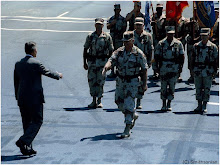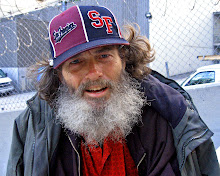By Dr. Richard O’Connor
The other day I saw a homeless
man and his homeless dog asleep on the sidewalk just outside the subway station
at Astor Place. It was 5:30 p.m., quite crowded, and everyone had to step
carefully around them, but no one looked directly at them. I'm from out of
town, but I visit New York regularly enough that I probably wouldn't have paid
any attention either except for the dog. How can a dog sleep like that on a
busy sidewalk? What's the attachment between the man and the dog? How long have
they been together?
David Brook's marvelous book, Bobos in Paradise discusses an
uncomfortable but hilarious look at contemporary Yuppie culture; the people who
make a fetish of latte and natural fibers and who view shopping as a means of
self-expression. One of his themes is the cooptation and assimilation of
oppressed cultures. [For instance] we want to believe we can save the world by
shopping, that we support indigenous people by venerating their handicrafts,
artifacts, and foods. "We want our material things to be bridges that will
allow us to effect positive social change", Brooks states (p. 101). It's a way of
rationalizing away our guilt about all the money the new economy seems bent on
handing us.
The problem the author sees is that
irony is wasted on the shameless. [Case-in-point] last night I saw a new
commercial for the Land Rover. It shows a young-middle-aged couple using their
$65,000 SUV to rescue a dog lost on a busy highway on a rainy night. The screen
fades to black with the single word "Courage" illuminated. See what
buying the right car means!
But back to the homeless man and his
dog. The shops around the homeless man and dog on Astor Place are full of third
world artifacts, places to buy things that make you feel like a good global
citizen. So if we're so concerned about the oppressed, how come we all walk
around the man and his dog?
Richard O'Connor, MSW, Ph.D., is
a psychotherapist in private practice in Connecticut and Manhattan. For 15 years he was the director of a large
nonprofit community mental health center. Dr. O’Connor received his MSW and
Ph.D. from the University of Chicago, and extended his education through the
Chicago Institute for Psychoanalysis and the Family Institute of Chicago. He publishes a blog at www.UndergoingDepression.com.
_______________ -
Invite your family and friends to Subscribe! to Homeless In America.
- Scroll down to the bottom of the page and vote in the polls.
- List yourself as a blog follower, middle right column.
- Donate! to the poor homeless deliveries of food, water, clothing, blankets, socks, underwear, soap, shampoo, toothbrushes and toothpaste, pocket Bibles, rosaries and prayer cards at http://servantsofthefather.org/donate_2_homeless
- Post checks to - Servants of the Father of Mercy, Inc., P.O. Box 42001, Los Angeles, CA 90042. All Donations are Tax Deductible.



























1 comment:
Dear Dr. Richard O’Connor
I have seen your image of the tramp and his dog a few times on the web in a few places and finally i hope tracked it down to the owner ( I hope ) i would love to do a piece of artwork based on your photo and wanted your permission to do so .
The artwork would eventually go up for sale and once sold i would be happy to donate some of the sale price to a homeless shelter in london as this is my city
Kind regards
kimberley thomas
Post a Comment